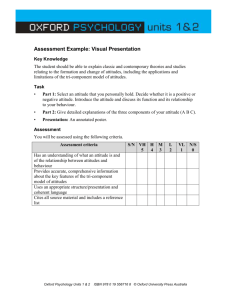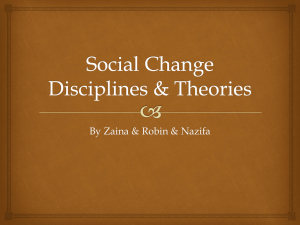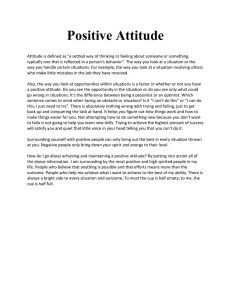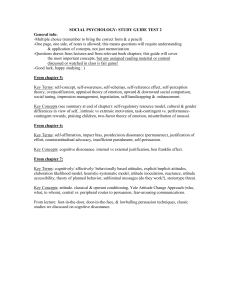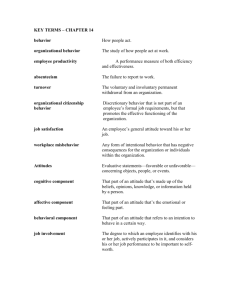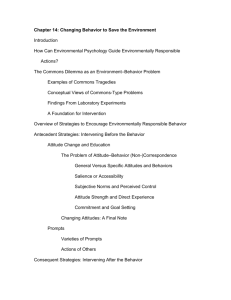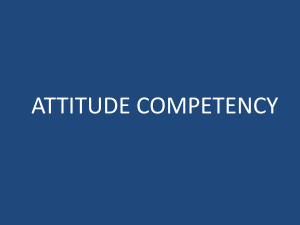Attitudes
advertisement
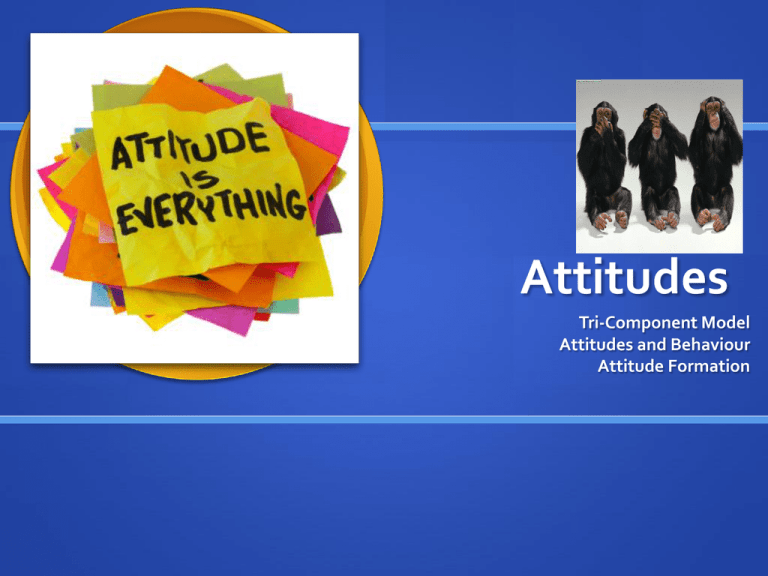
Attitudes Tri-Component Model Attitudes and Behaviour Attitude Formation Limitations of the Tri-Component Model Does a person’s attitude ALWAYS enable us to predict their behaviour? La Piere – 1934 – Conducted an experiment on people’s attitudes and behaviour toward the Chinese race in America All but one establishment accepted the couple as customers/tenants However, when La Piere sent a questionnaire to the visited establishments, 50% said they would turn a person of Chinese race away Concluded that attitude does not always determine behaviour Learning Activity 8.4 7. Identify two limitations or criticisms of the research method 8. Identify a key ethical issue relevant to the research CAN YOU NAME SOME CIRCUMSTANCES OR CONDITIONS THAT MAY RESULT IN OUR BEHAVIOUR NOT MATCHING OUR ATTITUDE? Strength of the Attitude Strong attitude = Usually thought about, well known and easily accessible… It is often personally relevant and emotive to the individual More likely to be consistent over time, resistant to change and influence behaviour Do you think someone’s exposure or knowledge on a certain topic would effect the strength of their attitude? Direct vs Indirect experience SAME SEX MARRIAGE & WOMEN IN SPORT WHAT DO YOU FEEL STRONGLY ABOUT? Accessibility of the Attitude Similarly to the strength of an attitude, the more accessible an attitude is to an individual, the more likely it will predict behaviour One way to identify the accessibility of an attitude is through the speed in which an individual can state it…(Fazio & Williams 1986) VOLUNTEER – ONE WORD – ONE RESPONSE Social Context of the Attitude Do you think that where you are, who you are with and other social circumstances influence your behaviour, no matter what your attitude is? Who has a part time job? Retail? Felt pressured into something? Perceived Control Over the Behaviour Definition: Perceived control is the belief an individual has that they are free to perform or not perform behaviour linked to an attitude and a belief that they can actually perform that behaviour (Ajzn & Fishbein, 2002) Define perceived control in YOUR OWN WORDS – If you are having trouble, read the example in your text book Complete Learning Activity 8.7 Factors Influencing Attitude Formation Attitudes are formed! Learning – Classical Conditioning, Operant Conditioning and Modeling Classical Conditioning Classical conditioning is a simple form of learning which occurs through repeated association of two different stimuli Stimulus = event which may trigger a response – i.e. A gun shot may trigger fright (scream, jump, duck for cover etc. Some stimuli do not trigger a response – but we can be conditioned to change/activate a response to a particular stimulus through classical conditioning Pavlov’s Dog http://www.youtube.com/watch?v=hhqumfpxuzI Operant Conditioning Operant conditioning is a kind of learning which is based on the assumption that we tend to repeat behaviour which has a desirable consequence or result, and tend not to repeat behaviour which has an undesirable consequence or result http://www.youtube.com/watch?v=I_ctJqjlrHA Activity: Are you as smart as a pigeon? Modelling Modelling occurs when someone uses observation of another persons actions and their consequences to guide their future thoughts, feelings or behaviour… http://www.youtube.com/watch?v=hHHdovKHDNU&feat ure=related Repeated Exposure Attitudes can also be formed through simply being exposed to an object, person, group, event or issue repeatedly… Mere exposure effect – The increase in liking for an attitude, object, person, group, event or issue as a result of being repeatedly exposed to it How do these learning processes effect attitude? Classical Conditioning – The pairing and consequent association of two stimuli that is essential for learning to occur and attitudes to form Operant Conditioning – Reinforcement strengthens our attitude, punishment weakens our attitude Modelling – Media and social relationships – you see your parents or people you idealise being complimented for a particular attitude, you are more likely to adopt it Complete Learning Activity 8.8 Cognitive Dissonance Psychological tension or discomfort when the way in which we actually behave is different from the way we believe we should behave What do we do to decrease the unpleasant psychological feeling?.... If someone you really liked and saw a future with broke up with you, how would you change your attitude? Instead of changing the attitude, what else can we change to decrease cognitive dissonance? Cognitive Dissonance Simply reducing the importance we give our attitudes towards the behaviour will avoid dissonance “Playing strenuous sport is not such a good idea, and I probably get enough exercise in daily activities anyway” Or we can add new elements to the situation to support our belief in the attitude or behaviour “I don’t play sport because I have a bad knee”
